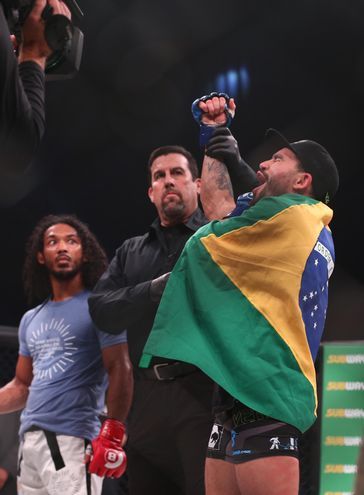The fun thing to do nowadays is to make jokes about Bellator MMA, the sport’s #2 promotion, who has twice tried to jump into the pay-per-view market, and has twice seen its main event go up in smoke. While the first effort led to a nifty transformation of Bellator 106 into a stacked free card that delivered one of the fights of the year as its second-choice main event, the promotion has decided to go forward with Bellator 120 on PPV, and has promoted the light heavyweight “grudge match” of Quinton “Rampage” Jackson vs. Muhammed “King Mo” Lawal to the top of the marquee. This is misguided on many levels, and only serves to reinfore the idea that Bellator is moving in the wrong direction. So in the first of a new series for MMA Ratings, I’ll offer up a few ideas for how Bellator can get back on the right track:
Make Tournaments the Focus Once Again
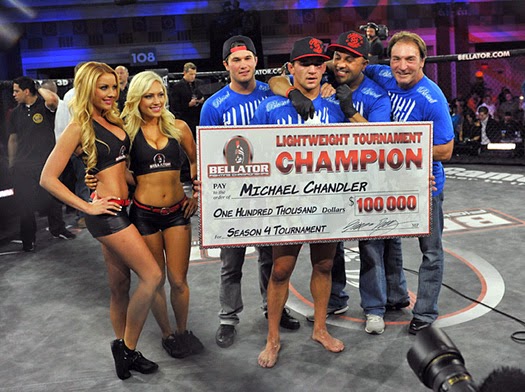
Despite the fact that the Ultimate Fighting Championship began as a one-night tournament, and the PRIDE Grand Prix tournaments are beloved by longtime hardcore MMA fans, the general fan attitude towards Bellator tournaments is a negative one. While admittedly, their “the toughest tournament in sports” claim is pure bluster, that slogan is the key to ensuring Bellator’s survival as a distinct alternative to the UFC’s MMA Monolith. The UFC’s PPV-based model thrives on stars, but for Bellator, the tournament has to be the star. It shouldn’t just be a means to an end, a way of deciding title challengers; it should be a big deal in and of itself.
One way to do that is to eliminate champions altogether, and ONLY crown tournament champions. It would mirror traditional sports in that way, as the goal would be to win the tournament every season, and multiple tournament wins would be the new markers of prestige. This would be my preferred approach – the season would be split into halves, each running tournaments in four divisions and tournament qualifiers in the four other divisions (Bellator should bring in either men’s or women’s flyweights to round out the divisions). This would also allow the promotion to increase the prize for winning, and reinforce the idea of the tournament win as a great achievement, and not merely a steppingstone.

Unfortunately, it’s unlikely that Bellator would consider such a radical step. The promotion and its partner Viacom like their champions, and contracts would need to be reworked to get the existing champions to re-enter tournaments every year. However, I think that ultimately that would be the best approach, even if a tournament winner chose to forgo the opportunity to defend his or her championship in the subsequent season. With regard to the tournament itself, I’d suggest a few tweaks:
Seeding: Like in other sports, every tournament participant should have a number next to his or her name. When the tournament is announced, the fighters involved should be seeded based on their respective divisional rankings. There should be brackets, and fans should know exactly who would be facing who in each round, with no shenanigans.
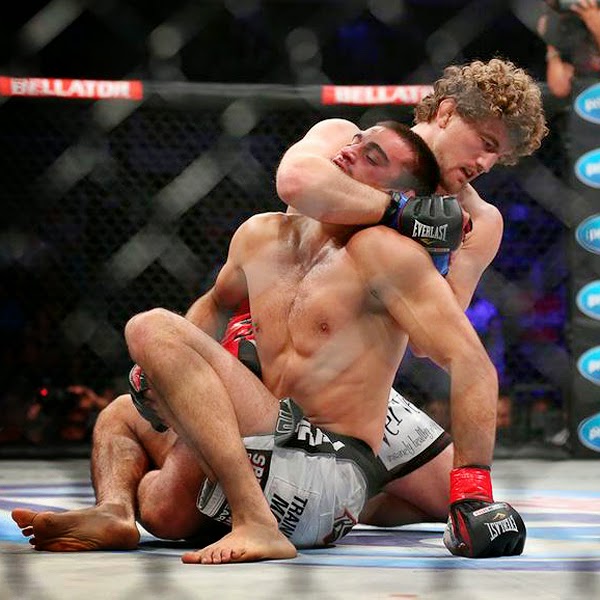
Tournament Byes when necessary: This might be controversial, but as a bit of a concession to the idea that some fighters have proven themselves to be dominant within the division for some time, where appropriate, a #1 seed may be awarded a first round bye, thus rendering the tournaments 7-fighter competitions instead of the full 8.
Tournament Qualifiers/Reserves: As detailed above, with only one tournament per year, the eight (or seven) tournament spots will be coveted. Some fighters will receive automatic tournament berths, but in the non-tournament half-season, all fights will be considered tournament qualifiers, as they will be taken into account in deciding pre-tournament rankings. The top-ranked fighters will be offered spots in the tournament, while the next tier will be named as tournament reserves, in case a fighter is injured or misses weight.
Bellator should also pursue sponsorships for each tournament. This would not only help to distinguish each division, but go a long way towards making each tournament seem like a bigger deal.
Use Stars More Wisely
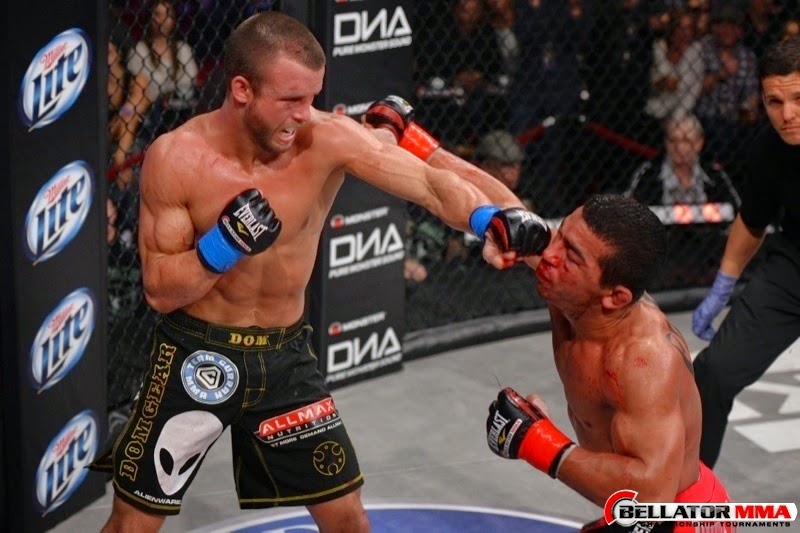
While Bellator played a large role in bastardizing the term “superfight,” the idea of putting its stars into big fights outside of the constraints of the tournament wasn’t a bad one. However, because the pursuit of the world championship remained in focus, it was hard to embrace the idea of big fights involving champions where the titles weren’t on the line. But the truth is, sometimes a fight is a good fight whether or not there are any title implications. And if the UFC can make five-round main events without a title at stake, so too could Bellator. It needn’t create a made up interim title as a flimsy excuse for a fight to be considered a big deal. Fights like Rampage vs. King Mo could just be made outright where appropriate. One of the things that made World Series of Fighting more attractive destinations for fighters like Jon Fitch, Jake Shields, and Melvin Guillard was the flexibility for them to be put into featured fights without having to be in the tournament.
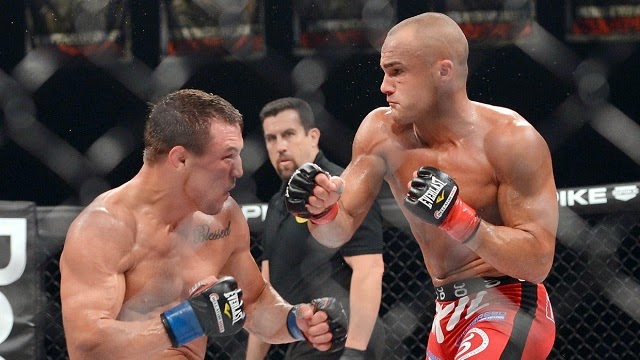
The situation with Eddie Alvarez and Michael Chandler is another example of inflexibility hurting the company. By all rights, Bellator should have let Alvarez fight out his contract and receive a heroic send-off to the greener pastures of the UFC. If the promotion wanted to give him a rematch against Chandler as his final fight, it would have been risky, but the lightweight title and its attendant champion’s clause only served to complicate matters that much further. Even with Alvarez winning, the two would have been 1-1, but Chandler would have still been the promotion’s top lightweight, favored to win another tournament. Instead, the rubber match — which has since been delayed even further — is even riskier, as Chandler could, with a second loss, be viewed as a paper champion if he ends up winning whatever fight crowns a new champion. And if Chandler loses to Will Brooks on Saturday night, there won’t even be a rematch.
Now, the structure that I outlined earler would have alleviated those issues. Chandler, with a tournament win under his belt, could re-enter the tournament year after year and blow fighters out, and face interesting challenges in the non-tournament session. He’d remain heavily-exposed as one of the promotion’s top stars, and in the event that he chose to sit out a tournament one season, whoever won in his stead would have created built-in interest for a showdown with the multiple-time tournament champion.

Saturday night’s fight with Tito Ortiz taking on Alexander Shlemenko is exactly the kind of fight that should happen in a non-tournament cycle. Shlemenko is a middleweight, but a fight with Ortiz at light heavyweight is a way to build up his exposure, and even a loss wouldn’t affect his standing as Bellator’s top middleweight. However, if he wins, instead of having to wait around for another contender to matriculate through the middleweight tournament, Shlemenko could benefit from that exposure by fighting through it again as the #1 seed.
In the second part of the piece, I’ll explore how Bellator can better utilize its Viacom partner, and embrace its role as a live sports program on cable television, rather than a shaky PPV commodity.
**********

Bellator 120: Rampage vs. King Mo (formerly Bellator 120: Alvarez vs. Chandler III) takes place on May 17, 2014 at The Landers Center in Memphis, Tennessee.
Click the stars to rate how good you think Bellator 120 will be.




